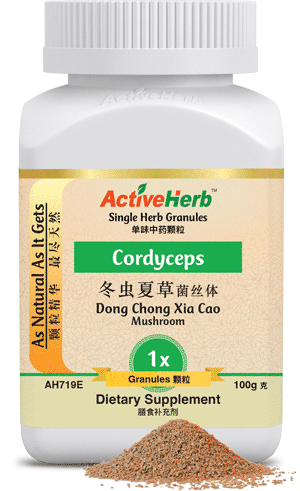Herbal Energy Drinks: These 5 Chinese Herbal Teas Wake You Up From A Food Coma

You’re bloated, exhausted and the only thing that you feel like doing is plopping down on the sofa, watching mindless TV and passing out. Ah, the holidays must be upon us.
At some point, though, you’re going to have to peel yourself off the couch and get back to reality. And when you do, it’s going to be rough going. Many people will try to come back to life by drinking multiple cups of coffee. But TCM offers a less acidic and arguably healthier alternative—instant herbal energy tea.
Unlike hyper-caffeinated and sugar-added name-brand energy drinks, these 5 Chinese herbs are best for getting you back to balance after the holidays—or anytime of year.
Best TCM Herbal Energy Drinks
#1: Cordyceps
It probably sounds bizarre to drink a fungus for energy. But Cordyceps (Dong Chong Xia Cao) is an edible mushroom that gained notoriety in the 1992 summer Olympics in Barcelona.
During those games, several Chinese women track team athletes broke multiple world records. Of course, many people attributed their success to performance-enhancing drugs. But what really helped the females blow away the competition was Cordyceps.
Indeed, small research studies on humans support the fantastic fungus for endurance and energy. So if you like doing CrossFit or other serious cardio and the holidays have slowed you down, drink Cordyceps tea to get you back in the saddle.
According to TCM theory, Cordyceps is a Lung tonic, meaning that it strengthens and supports the entire lung organ system of Chinese medicine.
More accurately, Cordyceps isn’t actually a mushroom because mushrooms are the fruiting bodies of fungus. In nature, cordyceps is a fungus that grows on caterpillar larvae.
It’s amazing that each serving of Cordyceps tea costs only 63 cents, considering that it’s probably the rarest herb in traditional Chinese medicine. Actually, the reason why ActiveHerb Cordyceps is so affordable is because Cordyceps cultivation has created skyrocketing prices in Tibet and the herb has become unsustainable. So this Cordyceps is lab-grown to preserve the precious resource in the Himalayas.
—> Get 50 servings of Cordyceps tea Cordyceps for only $31.
#2: Siberian Ginseng
In the mid-20th century, Soviet researchers studied Eleuthero Root and noticed some impressive results. Soldiers were able to train and fight on the battlefield in intense combat conditions for much longer if they were administered eleuthero root, aka Siberian Ginseng (Ci Wu Jia). Workers with jobs that required intense periods of concentration and endurance improved their performance with Siberian Ginseng.
These studies would launch a class of herbs known as resistogens, so-called because they resist extreme stress in the body. Resistogens have come to be known by the more trendy term, adaptogens.
Certain adaptogens have been shown in research studies to support the body’s energetic potential at the cellular level.
200 servings of Siberian Ginseng tea is only $35 (18 cents per serving).
#3 Ginseng
Why did the Soviet researchers focus their study on Siberian Ginseng and not regular ginseng? Why was it the study of Siberian ginseng (which is not true Panax ginseng; that’s the subject for another time) that launched the field of adaptogens? The reason why is because real ginseng is so rare and “found to be impractical as a source of raw material for the mass production of medicines,” reads the study above on Siberian Ginseng.
Indeed, real ginseng is pricier than Siberian Ginseng. In comparison to the $35 price tag for one bottle of Siberian Ginseng extract granules, real Ginseng (aka Korean Ginseng, Asian Ginseng, and Ren Shen in Chinese) costs $69.
But when you’re the King of all Chinese herbs, you can name your own price. Still, at 69 cents a serving, it costs much less than a cup of coffee or energy drink.
In TCM theory, Ren Shen works by tonifying the body’s primal Qi, which can help restore the body’s vital energy. Ren Shen also restores the pulse, benefits the Lungs and generates bodily fluids. No other brand-name energy drink can do all that!
#4 Codonopsis
Not to be confused with cordyceps, this strange-sounding herb is used as a replacement for rare, pricey ginseng. Known as Dang Shen in Chinese, Codonopsis Root supports energy by strengthening the organ in TCM theory that’s chiefly responsible for transforming food into Qi: the Spleen.
One of the most widely used herbs in Chinese medicine for restoring vital energy, Dang Shen costs just 50 cents per serving.
#5 Astragalus
Astragalus Root, aka Huang Qi is perhaps better known for its role in immune function support. But it’s also a potent Qi tonic that benefits the Lung and Spleen channels. Therefore, it supports respiratory and digestive function.
Approximately 67 servings of Huang Qi costs only $23.98 or 35 cents per serving.
You obviously don’t have to buy all 5 of these TCM herbal energy drinks to notice positive effects. Just try one at a time.
Resurrect Your Qi After The Holidays With This “Herbal Energy TCM Multivitamin”
Supporting your energy is also easy with QiVive, available in tablet or capsule form. QiVive supports energy, physical strength and endurance and digestion.
Visit here for a list of all ActiveHerb.com energy support formulas.
Interested in learning more? Check out these articles from our Blog:
Tired of Feeling Tired? Support Your Energy with Chinese Medicine
Can Chinese Medicine Help You Replace Coffee & Energy Drinks?
What’s are some of your favorite herbal energy drinks? Leave a comment below and get the conversation started.







